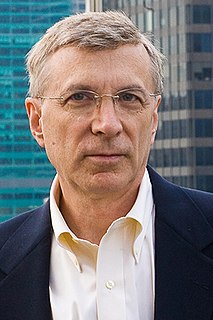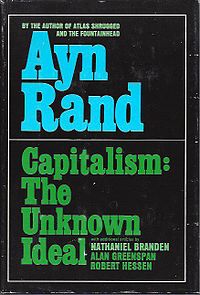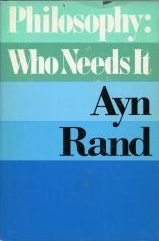
Objectivism is a philosophical system developed by Russian-American writer and philosopher Ayn Rand. She described it as "the concept of man as a heroic being, with his own happiness as the moral purpose of his life, with productive achievement as his noblest activity, and reason as his only absolute".

Leonard Sylvan Peikoff is a Canadian-American philosopher. He is an Objectivist and was a close associate of Ayn Rand, who designated him heir to her estate. He is a former professor of philosophy and host of a nationally syndicated radio talk show. He co-founded the Ayn Rand Institute (ARI) in 1985 and is the author of several books on philosophy.

This is a bibliography for Ayn Rand and Objectivism. Objectivism is a philosophical system initially developed in the 20th century by Rand.

Introduction to Objectivist Epistemology is a book about epistemology by the philosopher Ayn Rand. Rand considered it her most important philosophical writing. First published in installments in Rand's journal, The Objectivist, July 1966 through February 1967, the work presents Rand's proposed solution to the historic problem of universals, describes how the theory can be extended to complex cases, and outlines how it applies to other issues in the theory of knowledge.

David Christopher Kelley is an American philosopher. He is a professed Objectivist, though his position that Objectivism can be revised and influenced by other schools of thought has prompted disagreements with other Objectivists. Kelley is also an author of several books on philosophy and the founder of The Atlas Society, an institution he established in 1990 after permanently dissociating with Leonard Peikoff and the Ayn Rand Institute.

The Ayn Rand Institute: The Center for the Advancement of Objectivism, commonly known as the Ayn Rand Institute (ARI), is a 501(c)(3) nonprofit think tank in Santa Ana, California, that promotes Objectivism, the philosophy developed by Ayn Rand. The organization was established in 1985, three years after Rand's death, by Ed Snider and Leonard Peikoff, Rand's legal heir.

Harry Binswanger is an American philosopher. He is an Objectivist and a board member of the Ayn Rand Institute. He was an associate of Ayn Rand, working with her on The Ayn Rand Lexicon and helping her edit the second edition of Rand's Introduction to Objectivist Epistemology. He is the author of How We Know: Epistemology on an Objectivist Foundation (2014).

The Early Ayn Rand: A Selection from Her Unpublished Fiction is an anthology of unpublished early fiction written by the philosopher Ayn Rand, first published in 1984, two years after her death. The selections include short stories, plays, and excerpts of material cut from her novels We the Living and The Fountainhead.

Objectivism: The Philosophy of Ayn Rand is a 1991 book by the philosopher Leonard Peikoff, in which the author discusses the ideas of his mentor, Ayn Rand. Peikoff describes it as "the first comprehensive statement" of Rand's philosophy, Objectivism. The book is based on a series of lecture courses that Peikoff first gave in 1976 and that Rand publicly endorsed. Peikoff states that only Rand was qualified to write the definitive statement of her philosophic system, and that the book should be seen as an interpretation "by her best student and chosen heir." The book is volume six of the "Ayn Rand Library" series edited by Peikoff.

The Nathaniel Branden Institute (NBI), originally Nathaniel Branden Lectures, was an organization founded by Nathaniel Branden in 1958 to promote Ayn Rand's philosophy of Objectivism. The institute was responsible for many Objectivist lectures and presentations across the United States. Many of those associated with NBI worked on the Objectivist magazines, The Objectivist Newsletter and The Objectivist.

The Romantic Manifesto: A Philosophy of Literature is a collection of essays regarding the nature of art by the philosopher Ayn Rand. It was first published in 1969, with a second, revised edition published in 1975. Most of the essays are reprinted from Rand's magazine The Objectivist.

The Objectivist movement is a movement of individuals who seek to study and advance Objectivism, the philosophy expounded by novelist-philosopher Ayn Rand. The movement began informally in the 1950s and consisted of students who were brought together by their mutual interest in Rand's novel, The Fountainhead. The group, ironically named "the Collective" due to their actual advocacy of individualism, in part consisted of Leonard Peikoff, Nathaniel Branden, Barbara Branden, Alan Greenspan, and Allan Blumenthal. Nathaniel Branden, a young Canadian student who had been greatly inspired by The Fountainhead, became a close confidant and encouraged Rand to expand her philosophy into a formal movement. From this informal beginning in Rand's living room, the movement expanded into a collection of think tanks, academic organizations, and periodicals.

Ayn Rand's philosophy of Objectivism has been and continues to be a major influence on the right-libertarian movement, particularly libertarianism in the United States. Many right-libertarians justify their political views using aspects of Objectivism.

Ayn Rand, author and developer of Objectivism, held controversial views regarding homosexuality and gender roles. Although Rand personally viewed homosexuality negatively, considering it immoral and disgusting, she endorsed non-discrimination protection for homosexuals in the public sphere while opposing laws against discrimination in the private sector on the basis of individual rights.

Capitalism: The Unknown Ideal is a collection of essays, mostly by the philosopher Ayn Rand, with additional essays by her associates Nathaniel Branden, Alan Greenspan, and Robert Hessen. The authors focus on the moral nature of laissez-faire capitalism and private property. They have a very specific definition of capitalism, a system they regard as broader than simply property rights or free enterprise. It was originally published in 1966.

Philosophy: Who Needs It is a collection of essays by the philosopher Ayn Rand, published posthumously in 1982. It was the last book on which Rand worked during her lifetime.

On Ayn Rand is a book about the life and thought of 20th-century philosopher Ayn Rand by scholar Allan Gotthelf. It was published in early 2000 by Wadsworth Publishing in its Wadsworth Philosophers series.

Objectivist periodicals are a variety of academic journals, magazines, and newsletters with an editorial perspective explicitly based on Ayn Rand's philosophy of Objectivism. Several early Objectivist periodicals were edited by Rand. She later endorsed two periodicals edited by associates, and a number of others have been founded since her death.
Ayn Rand's Objectivism rejects an array of ideas and modes of living that it deems are primitive by nature and indicative of a primitive culture. Objectivism views primitive states of existence as being "savage" and marred in mysticism, fatalism, ignorance, superstition, poverty, passivity, and collectivism. The cure to such a society Objectivism holds is Western civilization, capitalism and modernity, which in its view brings with it reason, individualism, science, industrialization, and ultimately wealth.

The Ayn Rand Cult is a book by journalist Jeff Walker, published by Open Court Publishing Company in 1999. Walker discusses the history of the Objectivist movement started by novelist and philosopher Ayn Rand, which he describes as a cult.












